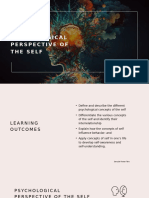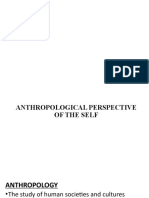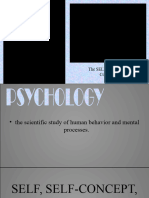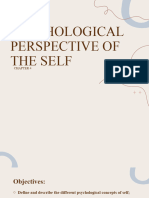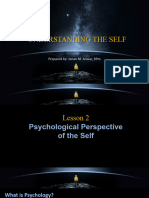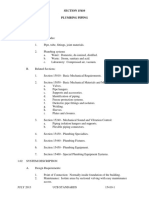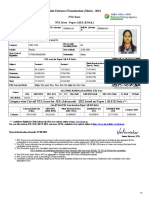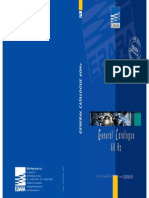0 ratings0% found this document useful (0 votes)
4 Psychological Self
4 Psychological Self
Uploaded by
Jhal Mark Le VillarealThis document discusses several psychological theories of understanding the self, including:
1) William James' concept of the "me-self" and "I-self", referring to the empirical and thinking selves.
2) Carl Rogers' theory of the real and ideal self, and how congruence between them leads to fulfillment.
3) David Lester's view of managing multiple selves versus a unified self during adolescence.
4) Winnicott's notion of the true self hidden by a protective false self.
5) Albert Bandura's view of humans as proactive agents with intentionality, forethought, and self-reflection.
Copyright:
© All Rights Reserved
Available Formats
Download as PPTX, PDF, TXT or read online from Scribd
Download as pptx, pdf, or txt
4 Psychological Self
4 Psychological Self
Uploaded by
Jhal Mark Le Villareal0 ratings0% found this document useful (0 votes)
This document discusses several psychological theories of understanding the self, including:
1) William James' concept of the "me-self" and "I-self", referring to the empirical and thinking selves.
2) Carl Rogers' theory of the real and ideal self, and how congruence between them leads to fulfillment.
3) David Lester's view of managing multiple selves versus a unified self during adolescence.
4) Winnicott's notion of the true self hidden by a protective false self.
5) Albert Bandura's view of humans as proactive agents with intentionality, forethought, and self-reflection.
Copyright
© © All Rights Reserved
Available Formats
PPTX, PDF, TXT or read online from Scribd
Share this document
Did you find this document useful?
Is this content inappropriate?
This document discusses several psychological theories of understanding the self, including:
1) William James' concept of the "me-self" and "I-self", referring to the empirical and thinking selves.
2) Carl Rogers' theory of the real and ideal self, and how congruence between them leads to fulfillment.
3) David Lester's view of managing multiple selves versus a unified self during adolescence.
4) Winnicott's notion of the true self hidden by a protective false self.
5) Albert Bandura's view of humans as proactive agents with intentionality, forethought, and self-reflection.
Copyright:
© All Rights Reserved
Available Formats
Download as PPTX, PDF, TXT or read online from Scribd
Download as pptx, pdf, or txt
0 ratings0% found this document useful (0 votes)
4 Psychological Self
4 Psychological Self
Uploaded by
Jhal Mark Le VillarealThis document discusses several psychological theories of understanding the self, including:
1) William James' concept of the "me-self" and "I-self", referring to the empirical and thinking selves.
2) Carl Rogers' theory of the real and ideal self, and how congruence between them leads to fulfillment.
3) David Lester's view of managing multiple selves versus a unified self during adolescence.
4) Winnicott's notion of the true self hidden by a protective false self.
5) Albert Bandura's view of humans as proactive agents with intentionality, forethought, and self-reflection.
Copyright:
© All Rights Reserved
Available Formats
Download as PPTX, PDF, TXT or read online from Scribd
Download as pptx, pdf, or txt
You are on page 1/ 22
Psychological Perspective in
Understanding the Self
Instr. Jhal Mark Le M. Villareal, RPm
What is psychology?
Psychology: is the scientific study of human
behavior and mental processes.
Four goals of psychology
1. Describe – what the person is doing
2. Explain – why is s/he doing that?
3. Predict – what is he going to do?
4. Modify – how can we change the behavior
• This topic present the psychological theories
that influences the way people understand the
self and the growth process to live life to the
full.
• Understanding of the self is highest when the
different parts of the self becomes integrative.
• An important aspect of understanding the self
is awareness
WILLIAM JAMES’ CONCEPT OF SELF:
“The Me-self and the I-Self”
• The self is divided in two categories: the “I-self”
and the “me-self”
• The “i-self” refers to the self that knows who he or
she is.
• James believed that the “I-self” is the thinking self.
• The “I-self” reflects the soul of a person or what is
now thought of as the mind and is called the pure
ego.
• The “me-self” is the empirical self. It refers to
describing the person’s personal experiences
and further divided into sub-categories:
material self, social self, and spiritual self.
• The material self consists of things that belong
to a person such as the body, clothes house, etc.
• The social self refers to whom and how a
person acts on social situations.
• The spiritual self refers to the most intimate
and important part of the self that includes
the person’s purpose, motives, emotions,
values, conscience, and moral behavior.
• James believed that the path to
understanding the spiritual self is through
introspection.
CARL ROGERS SELF THEORY
Real and Ideal Self
• Another aspect of self-understanding is self concept.
• Self-concept refers to the image of oneself.
• Psychologist Carl Rogers defined the self as a
flexible and changing perception of personal
identity.
• The self develops from interactions with significant
people and self-awareness
• According to Rogers, human beings are always
striving to for self-fulfillment, or self-actualization.
• When the needs of the self are denied severe
anxiety may result.
• Central to achieving self-actualization is
development of self-concept
• Rogers suggest that there are two components
of self-concept: Real-self and ideal Self
• Real self consists of all the ideas, including the
awareness of ‘what I am’ and ‘what can I do.’
• The ideal self is the person’s conception of
what one should be or wanted to be that
includes one’s goals and ambitions in life.
• The closer (congruent) the ideal self is to the
real self, the more fulfilled and happy the
individual becomes. The farther (incongruent)
the ideal self is to the real self leads to
unhappy and dissatisfied person.
DAVID LESTER
Multiple versus Unified self
Multiple versus Unified self
• Self-understanding in adolescents also includes
conceptualizing the self as multiple or unified and true or
false.
• The construction of multiple selves varies across different
roles relationships
• Coping with different selves constitutes a formidable task
among adolescents
• These challenges contribute heavily to the young person’s
struggle for a unified self.
DONALD WINNICOTT
True versus False self
True versus False self
• Winnicott suggests that the self is composed of
the true self and the false self.
• The function of the false self is to hide and
protect the true self.
• People tend to display a false self to impress
others.
• The self can change depending on situations.
ALBERT BANDURA
The Self As Proactive and
Agentic
The self as proactive and agentic
• Albert bandura suggests that humans have ability to act
and make things happen.
• In his theory of the self, people viewed as proactive
agents of experiences
• Agency embodies the endowments, belief systems,
self-regulatory capabilities, and structures and
functions through which personal influence is
exercised, rather than residing as a distinct entity.
The self as proactive and agentic
• The main agentic features of human agency are:
intentionality, forethought, self-reactiveness,
and self-reflectiveness.
• Intentionality refers to acts done intentionally.
• Forethought enables the person to anticipate the
likely consequences of prospective actions.
“The choices you make at 19 will,
in some way, shape the person you
become at 29, and the person you
become at 39 will be influenced by
the choices you make at 19 and
29.”
The self as proactive and agentic
• Self-reactiveness enables the person to make
choices and choose appropriate courses of action,
as well as motivate and regulate their execution.
• Self-reflectiveness gives the person the ability to
reflect upon oneself and the adequacy of one’s
thoughts and actions. People are not only agents of
actions but self-examiners of their own functioning.
• Efficacy beliefs are the foundation of human
agency.
• Self-efficacy refers to the individual’s belief that
he or she is capable to perform a task.
• It influences whether people think pessimistically
or optimistically and in ways that are self-
enhancing or self-hindering.
• Efficacy beliefs play a central role in self-
regulation.
You might also like
- The Portrayal of Gays in Popular Filipino Films, 2000 To 2010No ratings yetThe Portrayal of Gays in Popular Filipino Films, 2000 To 201033 pages
- Psychological Perspective of The Self 2No ratings yetPsychological Perspective of The Self 243 pages
- Psychological Perspective of The Self: Presented By: Pereyra, Dennis Batuhan, Edward Lanoy, Cerela MarieNo ratings yetPsychological Perspective of The Self: Presented By: Pereyra, Dennis Batuhan, Edward Lanoy, Cerela Marie22 pages
- Canvas Psychological Perspective of SelfNo ratings yetCanvas Psychological Perspective of Self15 pages
- Lesson 4 The Self According To Psychology 3No ratings yetLesson 4 The Self According To Psychology 328 pages
- Lesson 4. From The Perspective of PsychologyNo ratings yetLesson 4. From The Perspective of Psychology31 pages
- Lesson-4.-From-the-Perspective-of-PsychologyNo ratings yetLesson-4.-From-the-Perspective-of-Psychology31 pages
- The Self and Its Development Journeying Back To One'S SelfNo ratings yetThe Self and Its Development Journeying Back To One'S Self52 pages
- Lesson 4. From The Perspective of Psychology 2 1No ratings yetLesson 4. From The Perspective of Psychology 2 128 pages
- The Self From Various Perspective PsychologyNo ratings yetThe Self From Various Perspective Psychology36 pages
- Lesson 4 - From The Perspective of PsychologyNo ratings yetLesson 4 - From The Perspective of Psychology37 pages
- The Self As Cognitive Construct: Xides Leonore P. Conwi, LPTNo ratings yetThe Self As Cognitive Construct: Xides Leonore P. Conwi, LPT33 pages
- Psychology: By: E/Cdt - Marc Augustus T. GarciaNo ratings yetPsychology: By: E/Cdt - Marc Augustus T. Garcia14 pages
- The Activities and Potentialities of the SelfNo ratings yetThe Activities and Potentialities of the Self15 pages
- GROUP 3 Psychological Perspective of The SelfNo ratings yetGROUP 3 Psychological Perspective of The Self31 pages
- Chapter 4 - Psychological Perspectives of The Self PART 1 PDFNo ratings yetChapter 4 - Psychological Perspectives of The Self PART 1 PDF18 pages
- One Block: A Self Help Journey Thoughts, Quotes & TheoriesFrom EverandOne Block: A Self Help Journey Thoughts, Quotes & TheoriesNo ratings yet
- What's your Emotional I.Q.: Assess your weaknesses and strengths in your emotions & feelings and groom fuller personalityFrom EverandWhat's your Emotional I.Q.: Assess your weaknesses and strengths in your emotions & feelings and groom fuller personalityNo ratings yet
- How To Improve Self-Esteem - The Peaceful Path to Building Lasting Self-EsteemFrom EverandHow To Improve Self-Esteem - The Peaceful Path to Building Lasting Self-EsteemNo ratings yet
- The Western and Eastern Concepts of SelfNo ratings yetThe Western and Eastern Concepts of Self13 pages
- Decimal Operations: Adding & Subtracting Multiplying DividingNo ratings yetDecimal Operations: Adding & Subtracting Multiplying Dividing1 page
- Session Session Objectives Resources Materials Needed Persons Involved Mentoring Date Expected OutputNo ratings yetSession Session Objectives Resources Materials Needed Persons Involved Mentoring Date Expected Output9 pages
- Fluid Damper: Created in COMSOL Multiphysics 5.3aNo ratings yetFluid Damper: Created in COMSOL Multiphysics 5.3a20 pages
- US Navy Course NAVEDTRA 14085 - Electronics Technician Supervisor (ET1)100% (1)US Navy Course NAVEDTRA 14085 - Electronics Technician Supervisor (ET1)194 pages
- Equalize-Xpi-Modules - JSON2XMLConverter - Java at Master Engswee - Equalize-Xpi-Modules GitHubNo ratings yetEqualize-Xpi-Modules - JSON2XMLConverter - Java at Master Engswee - Equalize-Xpi-Modules GitHub3 pages
- Emaar Industries & Investments (EII) Internal Audit Mammut Building Systems Balance Sheet & Internal Controls ReviewNo ratings yetEmaar Industries & Investments (EII) Internal Audit Mammut Building Systems Balance Sheet & Internal Controls Review66 pages
- 1970 Concrete Society of S A EstablishedNo ratings yet1970 Concrete Society of S A Established1 page
- Approaches To Social Action - Freire, Gandhi (Sarvodaya), Alinsky, Radical Social Work Rights Based ApproachNo ratings yetApproaches To Social Action - Freire, Gandhi (Sarvodaya), Alinsky, Radical Social Work Rights Based Approach18 pages
- Semester 01: Universiti Teknologi Mara Fakulti Undang-UndangNo ratings yetSemester 01: Universiti Teknologi Mara Fakulti Undang-Undang4 pages
- Computerized QuickBooks Accounting Training WAUNo ratings yetComputerized QuickBooks Accounting Training WAU5 pages
- Lee, Yeon Soo Lee, Jun Young Park, Sang Soo Lim, Chae Won KW - A Comparison of Bicortical and IntramNo ratings yetLee, Yeon Soo Lee, Jun Young Park, Sang Soo Lim, Chae Won KW - A Comparison of Bicortical and Intram6 pages
- Parts Catalogue DI 16 Marine Engines - CompressedNo ratings yetParts Catalogue DI 16 Marine Engines - Compressed745 pages
- Calcium Carbonate-Carbonic Acid EquilibriumNo ratings yetCalcium Carbonate-Carbonic Acid Equilibrium15 pages
- Instant download Academic Conference Presentations: A Step-by-Step Guide Mark R. Freiermuth pdf all chapter100% (1)Instant download Academic Conference Presentations: A Step-by-Step Guide Mark R. Freiermuth pdf all chapter41 pages
- The Portrayal of Gays in Popular Filipino Films, 2000 To 2010The Portrayal of Gays in Popular Filipino Films, 2000 To 2010
- Psychological Perspective of The Self: Presented By: Pereyra, Dennis Batuhan, Edward Lanoy, Cerela MariePsychological Perspective of The Self: Presented By: Pereyra, Dennis Batuhan, Edward Lanoy, Cerela Marie
- The Self and Its Development Journeying Back To One'S SelfThe Self and Its Development Journeying Back To One'S Self
- The Self As Cognitive Construct: Xides Leonore P. Conwi, LPTThe Self As Cognitive Construct: Xides Leonore P. Conwi, LPT
- Chapter 4 - Psychological Perspectives of The Self PART 1 PDFChapter 4 - Psychological Perspectives of The Self PART 1 PDF
- One Block: A Self Help Journey Thoughts, Quotes & TheoriesFrom EverandOne Block: A Self Help Journey Thoughts, Quotes & Theories
- What's your Emotional I.Q.: Assess your weaknesses and strengths in your emotions & feelings and groom fuller personalityFrom EverandWhat's your Emotional I.Q.: Assess your weaknesses and strengths in your emotions & feelings and groom fuller personality
- How To Improve Self-Esteem - The Peaceful Path to Building Lasting Self-EsteemFrom EverandHow To Improve Self-Esteem - The Peaceful Path to Building Lasting Self-Esteem
- Decimal Operations: Adding & Subtracting Multiplying DividingDecimal Operations: Adding & Subtracting Multiplying Dividing
- Session Session Objectives Resources Materials Needed Persons Involved Mentoring Date Expected OutputSession Session Objectives Resources Materials Needed Persons Involved Mentoring Date Expected Output
- US Navy Course NAVEDTRA 14085 - Electronics Technician Supervisor (ET1)US Navy Course NAVEDTRA 14085 - Electronics Technician Supervisor (ET1)
- Equalize-Xpi-Modules - JSON2XMLConverter - Java at Master Engswee - Equalize-Xpi-Modules GitHubEqualize-Xpi-Modules - JSON2XMLConverter - Java at Master Engswee - Equalize-Xpi-Modules GitHub
- Emaar Industries & Investments (EII) Internal Audit Mammut Building Systems Balance Sheet & Internal Controls ReviewEmaar Industries & Investments (EII) Internal Audit Mammut Building Systems Balance Sheet & Internal Controls Review
- Approaches To Social Action - Freire, Gandhi (Sarvodaya), Alinsky, Radical Social Work Rights Based ApproachApproaches To Social Action - Freire, Gandhi (Sarvodaya), Alinsky, Radical Social Work Rights Based Approach
- Semester 01: Universiti Teknologi Mara Fakulti Undang-UndangSemester 01: Universiti Teknologi Mara Fakulti Undang-Undang
- Lee, Yeon Soo Lee, Jun Young Park, Sang Soo Lim, Chae Won KW - A Comparison of Bicortical and IntramLee, Yeon Soo Lee, Jun Young Park, Sang Soo Lim, Chae Won KW - A Comparison of Bicortical and Intram
- Instant download Academic Conference Presentations: A Step-by-Step Guide Mark R. Freiermuth pdf all chapterInstant download Academic Conference Presentations: A Step-by-Step Guide Mark R. Freiermuth pdf all chapter
























